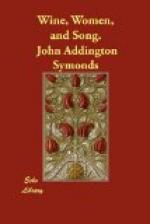THE LOVER’S VOW.
No. 39.
False the tongue and foul
with slander,
Poisonous treacherous tongue
of pander,
Tongue the hangman’s
knife should sever,
Tongue in flames to burn for
ever;
Which hath called me a deceiver,
Faithless lover, quick to
leave her,
Whom I love, and leave her
slighted,
For another, unrequited!
Hear, ye Muses nine! nay,
rather,
Jove, of gods and men the
father!
Who for Danae and Europa
Changed thy shape, thou bold
eloper!
Hear me, god! ye gods all,
hear me!
Such a sin came never near
me.
Hear, thou god! and gods all,
hear ye!
Thus I sinned not, as I fear
ye.
I by Mars vow, by Apollo,
Both of whom Love’s
learning follow;
Yea, by Cupid too, the terror
Of whose bow forbids all error!
By thy bow I vow and quiver,
By the shafts thou dost deliver,
Without fraud, in honour duly
To observe my troth-plight
truly.
I will keep the troth I plighted,
And the reason shall be cited:
’Tis that ’mid
the girls no maiden
Ever met I more love-laden.
’Mid the girls thou
art beholden
Like a pearl in setting golden;
Yea, thy shoulder, neck, and
bosom
Bear of beauty’s self
the blossom.
Oh, her throat, lips, forehead,
nourish
Love, with food that makes
him flourish!
And her curls, I did adore
them—
They were blonde with heaven’s
light o’er them.
Therefore, till, for Nature’s
scorning,
Toil is rest and midnight
morning,
Till no trees in woods are
growing,
Till fire turns to water flowing;
Till seas have no ships to
sail them,
Till the Parthians’
arrows fail them,
I, my girl, will love thee
ever,
Unbetrayed, betray thee never!
In the following poem a lover bids adieu for ever to an unworthy woman, who has betrayed him. This is a remarkable specimen of the songs written for a complicated melody. The first eight lines seem set to one tune; in the next four that tune is slightly accelerated, and a double rhyme is substituted for a single one in the tenth and twelfth verses. The five concluding lines go to a different kind of melody, and express in each stanza a changed mood of feeling.
I have tried in this instance to adopt the plaster-cast method of translation, as described above,[32] and have even endeavoured to obtain the dragging effect of the first eight lines of each strophe, which are composed neither of exact accentual dactyls nor yet of exact accentual anapaests, but offer a good example of that laxity of rhythm permitted in this prosody for music.




